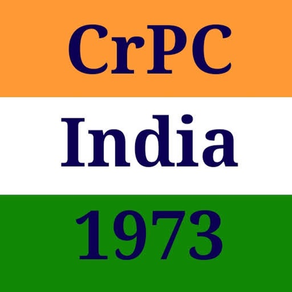
CrPC 1973 in English
The Code of Criminal Procedure
Free
1.6.0for iPhone, iPad and more
Age Rating
CrPC 1973 in English Screenshots
About CrPC 1973 in English
The Code of Criminal Procedure (CrPC ) is the main legislation on the procedure for administration of substantive criminal law in India. It was enacted in 1973 and came into force on 1 April 1974.[2] It provides the machinery for the investigation of crime, apprehension of suspected criminals, the collection of evidence, determination of guilt or innocence of the accused person and the determination of punishment of the guilty. Additionally, it also deals with public nuisance, prevention of offenses and maintenance of wife, child, and parents.
At present, the Act contains 484 Sections, 2 Schedules, and 56 Forms. The Sections are divided into 37 Chapters.
History
In medieval India, subsequent to the conquest by the Muslims, the Mohammedan Criminal Law came into prevalence. The British rulers passed the Regulating Act of 1773 under which a Supreme Court was established in Calcutta and later on at Madras and in Bombay. The Supreme Court was to apply British procedural law while deciding the cases of the Crown’s subjects. After the Rebellion of 1857, the crown took over the administration in India. The Criminal Procedure Code, 1861 was passed by the British parliament. The 1861 code continued after independence and was amended in 1969. It was finally replaced in 1972.
Classification of Offences under the Code
Cognizable and Non-cognizable Offences
Main article: Cognizable offence
Cognizable offences are those offences for which a police officer may arrest without court mandated warrant in accordance with the first schedule of the code. For non-cognizable cases the police officer may arrest only after being duly authorized by a warrant. Non-cognizable offences are, generally, relatively less serious offences than cognizable ones. Cognizable Offences reported under section 154 Cr.P.C while Non-Cognizable Offences reported under section 155 Cr.P.C. For Non-Cognizable Offences the Magistrate empowered to take cognizance under section 190 Cr.P.C. Under section 156(3) Cr.P.C the Magistrate is competent to direct the police to register the case, investigate the same and submit the challan/report for cancellation. (2003 P.Cr.L.J.1282)
Summons-Case and Warrant-Case
Under Section 204 of the code, a Magistrate taking cognizance of an offence is to issue summons for the attendance of the accused if the case is a summons case. If the case appears to be a warrant case, he may issue a warrant or summons, as he sees fit. Section 2(w) of the Code defines summons-case as, a case relating to an Offence, and not being a warrant-case. Section 2(x) of the Code defines warrant-case as, a case relating to an Offence punishable with death, imprisonment for life or imprisonment for a term exceeding two years.
At present, the Act contains 484 Sections, 2 Schedules, and 56 Forms. The Sections are divided into 37 Chapters.
History
In medieval India, subsequent to the conquest by the Muslims, the Mohammedan Criminal Law came into prevalence. The British rulers passed the Regulating Act of 1773 under which a Supreme Court was established in Calcutta and later on at Madras and in Bombay. The Supreme Court was to apply British procedural law while deciding the cases of the Crown’s subjects. After the Rebellion of 1857, the crown took over the administration in India. The Criminal Procedure Code, 1861 was passed by the British parliament. The 1861 code continued after independence and was amended in 1969. It was finally replaced in 1972.
Classification of Offences under the Code
Cognizable and Non-cognizable Offences
Main article: Cognizable offence
Cognizable offences are those offences for which a police officer may arrest without court mandated warrant in accordance with the first schedule of the code. For non-cognizable cases the police officer may arrest only after being duly authorized by a warrant. Non-cognizable offences are, generally, relatively less serious offences than cognizable ones. Cognizable Offences reported under section 154 Cr.P.C while Non-Cognizable Offences reported under section 155 Cr.P.C. For Non-Cognizable Offences the Magistrate empowered to take cognizance under section 190 Cr.P.C. Under section 156(3) Cr.P.C the Magistrate is competent to direct the police to register the case, investigate the same and submit the challan/report for cancellation. (2003 P.Cr.L.J.1282)
Summons-Case and Warrant-Case
Under Section 204 of the code, a Magistrate taking cognizance of an offence is to issue summons for the attendance of the accused if the case is a summons case. If the case appears to be a warrant case, he may issue a warrant or summons, as he sees fit. Section 2(w) of the Code defines summons-case as, a case relating to an Offence, and not being a warrant-case. Section 2(x) of the Code defines warrant-case as, a case relating to an Offence punishable with death, imprisonment for life or imprisonment for a term exceeding two years.
Show More
What's New in the Latest Version 1.6.0
Last updated on May 10, 2023
Old Versions
Bug fixes and improvements
Show More
Version History
1.6.0
May 10, 2023
Bug fixes and improvements
1.4.0
Mar 7, 2020
Fixed a bug where share button was not working on iPad devices running iOS 13
1.3.0
Dec 24, 2019
Better Support for iOS 13
Fixed a bug in morning notifications.
Fixed a bug in morning notifications.
1.2.1
Aug 12, 2019
bug fixes
1.2.0
Aug 6, 2019
Performance Improvements
1.1.1
Jul 22, 2019
Bug fixes
1.1.0
May 16, 2019
Bug fixes and improvements
1.0
Oct 3, 2018
CrPC 1973 in English FAQ
CrPC 1973 in English is available in regions other than the following restricted countries:
France
CrPC 1973 in English supports English
Click here to learn how to download CrPC 1973 in English in restricted country or region.
Check the following list to see the minimum requirements of CrPC 1973 in English.
iPhone
Requires iOS 12.0 or later.
iPad
Requires iPadOS 12.0 or later.
iPod touch
Requires iOS 12.0 or later.





































